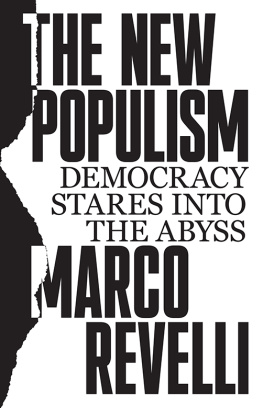
Series title
Key Concepts in Political Theory
- Charles Jones and Richard Vernon, Patriotism
- Roger Griffin, Fascism
- Peter J. Steinberger, Political Judgment
- Fabian Wendt, Authority
- Eric Mack, Libertarianism
- Elizabeth Cohen and Cyril Ghosh, Citizenship
- Peter Lamb, Socialism
- Benjamin Moffitt, Populism
Populism
Benjamin Moffitt
polity
Copyright page
Copyright Benjamin Moffitt 2020
The right of Benjamin Moffitt to be identified as Author of this Work has been asserted in accordance with the UK Copyright, Designs and Patents Act 1988.
First published in 2020 by Polity Press
Polity Press
65 Bridge Street
Cambridge CB2 1UR, UK
Polity Press
101 Station Landing
Suite 300
Medford, MA 02155, USA
All rights reserved. Except for the quotation of short passages for the purpose of criticism and review, no part of this publication may be reproduced, stored in a retrieval system or transmitted, in any form or by any means, electronic, mechanical, photocopying, recording or otherwise, without the prior permission of the publisher.
ISBN-13: 978-1-5095-3432-6
ISBN-13: 978-1-5095-3433-3 (pb)
A catalogue record for this book is available from the British Library.
Library of Congress Cataloging-in-Publication Data
Names: Moffitt, Benjamin, 1985- author. | Polity Press.
Title: Populism / Benjamin Moffitt.
Other titles: Key concepts in political theory.
Description: Medford, Massachusetts : Polity Press, 2020. | Series: Key concepts in political theory | Includes bibliographical references.
Identifiers: LCCN 2019027653 (print) | ISBN 9781509534326 (Hardback) | ISBN 9781509534333 (Paperback)
Subjects: LCSH: Populism.
Classification: LCC JC423 .M6435 2020 (print) | LCC JC423 (ebook) | DDC 320.56/62--dc23
LC record available at https://lccn.loc.gov/2019027653
LC ebook record available at https://lccn.loc.gov/2019027654
Typeset in 10.5 on 12pt Sabon
by Fakenham Prepress Solutions, Fakenham, Norfolk NR21 8NL
Printed and bound in Great Britain by TJ International Limited
The publisher has used its best endeavours to ensure that the URLs for external websites referred to in this book are correct and active at the time of going to press. However, the publisher has no responsibility for the websites and can make no guarantee that a site will remain live or that the content is or will remain appropriate.
Every effort has been made to trace all copyright holders, but if any have been overlooked the publisher will be pleased to include any necessary credits in any subsequent reprint or edition.
For further information on Polity, visit our website: politybooks.com
Dedication
For Ash and Will
Acknowledgements
This book was written over the course of 2018 and 2019, in the Department of Government at Uppsala University, Sweden, and in the National School of Arts at the Australian Catholic University in Melbourne, Australia. I am grateful for the generous support and opportunities provided by both institutions, and am particularly thankful to my kind colleagues in both places whose conversations and feedback have made this book much better. At Uppsala, I wish to thank my colleagues in the political theory seminar Sofia Nsstrm, Anthoula Malkopoulou, Gina Gustavsson, Sverker Gustavsson and Johan Wejryd for helping me think through a number of the arguments presented here. At my new institutional home, the Australian Catholic University, my thanks go to Mark Chou, Rachel Busbridge, Naser Ghobadzadeh, Noah Riseman and Michael Ondaatje, who gave me helpful feedback and advice and made me feel at home so quickly after my return to Australia. Outside these institutions, I am grateful to Jonathan Kuyper, Simon Tormey, John Keane, Benjamin de Cleen, Yannis Stavrakakis, Pierre Ostiguy and Francisco Panizza, whose conversations and correspondence have all contributed to the thinking I develop in this book. I also benefitted from feedback on papers and presentations that touched on some of the issues contained here all made at the ARENA Centre for European Studies in Oslo (April 2018) and at the UK Political Studies Associations Populism Specialist Group Workshop in Bath (March 2018). Lastly, I am grateful to all my colleagues in the world of populism studies whose work I cite and engage with in this book: without their research, I wouldnt have anything to write about, agree strongly with, get mad about, or analyse in depth here. Despite what it may look like to outsiders, the world of populism studies is actually an intellectually diverse, heterogeneous, open and friendly one, and I am very thankful for my colleagues generally open-minded and good-natured approach to academia its a real rarity.
I also wish to thank the two anonymous reviewers whose comments on the initial proposal for this book made it much sharper and ensured that I did not just slip into the all-too-common tendency to examine Eurocentric conceptions and examples of populism; and even more so to the four anonymous reviewers who reviewed the draft manuscript, providing perhaps the most constructive, fair and useful comments I have received in all my time of writing about populism. At Polity Press, many thanks to George Owers for commissioning the book and for his sharp and astute comments on the text, and to Julia Davies for her editorial assistance. Thanks also to Manuela Tecusan, whose meticulous and keen-eyed copy-editing improved the text immensely. The book is much better as a result of all these peoples generosity and hard work.
This research was partially supported by the Australian Government through the Australian Research Councils Discovery Early Career Researcher Award funding scheme (project DE190101127).
Elements of first appeared in Liberal Illiberalism? The Reshaping of the Contemporary Populist Radical Right in Northern Europe, in Politics and Governance (Moffitt 2017b), published under a Creative Commons Attribution 4.0 licence. I thank Cogitatio Press for permission to have these elements republished in this book.
Finally, I dedicate this book to Ash and Will. Ash has patiently listened to me drone on about populism for almost a decade now, and has asked the tricky questions that have helped me clarify what I am talking about when things sounded a little woolly; on the other hand, Will has distracted me from finishing this book as best as he could. For both those things and, more importantly, for their love and support I am eternally grateful!
Melbourne, June 2019
Why Populism Matters
If there is one concept that seems to have captured the flavour of global politics in the twenty-first century, it is populism. Used to describe a wide range of disruptive and prominent leaders (Donald Trump, Rodrigo Duterte, Hugo Chvez), parties (Podemos, One Nation, Alternative fr Deutschland (Alternative for Germany)), movements (Occupy Wall Street, the Indignados) and even events (Brexit), the term has become a popular catch-all for diagnosing all that is exciting, worrying or dysfunctional in contemporary democracies worldwide. Indeed, the Cambridge Dictionary named populism its Word of the Year for 2017, referring to its importance as a phenomenon thats both truly local and truly global, as populations and their leaders across the world wrestle with issues of immigration and trade, resurgent nationalism, and economic discontent (Cambridge Dictionary 2017).
Next page












